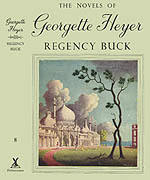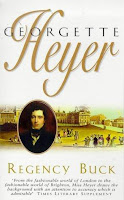I reread Regency Buck by Georgette Heyer, my first Heyer and first Regency romance ever that I read when I was seventeen. And that was a long, long time ago. I was given a copy as a present by my two aunts who lived in Bath. They lived on Lansdowne Place West, just off Lansdowne Crescent, and probably a couple of houses beyond the left side of this old photo. The field in front of the Crescent is still used for grazing.
My aunts told me they considered it was her best and the only one of them they’d consider reading more than once. Little did they know that I would then devour Heyers to the detriment of my academic pursuits. And I didn’t know then that I’d reap the benefits many years later. But I was afraid to reread Heyer because I suspected I wouldn’t enjoy her so much now and I didn’t want to be disillusioned; or I’d wax sentimental over the passage of time etc. Happily I emerged fairly well entertained and in good (nonphilosophical) spirits.

 Anyway, the book: rich heiress and dumb blonde brother (Judith and Perry Taverner) come to town and discover their guardian is a hottie (Lord Worth). Here’s the original 1935 cover (left) and here’s a more modern one that may seem familiar (scroll down). The one I’m reading is a Signet with a truly horrific cover featuring a fair-haired hero with lots of teeth that I haven’t been able to share with you, but I found a couple of others that are very pretty.
Anyway, the book: rich heiress and dumb blonde brother (Judith and Perry Taverner) come to town and discover their guardian is a hottie (Lord Worth). Here’s the original 1935 cover (left) and here’s a more modern one that may seem familiar (scroll down). The one I’m reading is a Signet with a truly horrific cover featuring a fair-haired hero with lots of teeth that I haven’t been able to share with you, but I found a couple of others that are very pretty.
 So, what did I think? It’s difficult to say. Sometimes it was quite eerie, reading again passages that I’d long forgotten about, rather like seeing a literary ghost. I recognized a scene that seemed to have, uh, influenced Dedication, where a fight is picked at a cockfight, resulting in a duel. I found it at times slow going and despite Heyer’s red herrings and attempts to make the plot a plot, it’s pretty obvious who is the hero and who the baddie (I remember figuring that out the first time I read it). The baddie attempts, in an incompetent sort of way, to kill her brother, intending to force Judith into marriage so he may enjoy her huge tracts o’ land. But never mind that plot business, as I always say.
So, what did I think? It’s difficult to say. Sometimes it was quite eerie, reading again passages that I’d long forgotten about, rather like seeing a literary ghost. I recognized a scene that seemed to have, uh, influenced Dedication, where a fight is picked at a cockfight, resulting in a duel. I found it at times slow going and despite Heyer’s red herrings and attempts to make the plot a plot, it’s pretty obvious who is the hero and who the baddie (I remember figuring that out the first time I read it). The baddie attempts, in an incompetent sort of way, to kill her brother, intending to force Judith into marriage so he may enjoy her huge tracts o’ land. But never mind that plot business, as I always say.
What I loved were Heyer’s details–clothes, places, objects–they’re quite brilliant, particularly her descriptions of journeys. Here’s the heroine’s first view of London:
As the chaise topped the rise and began the descent upon the southern side, the view spread itself before Miss Taverner’s wondering eyes. There were the spires, the ribbon of the Thames, and the great huddle of buildings of which she had heard so much, lying below her in a haze of sunlight. She could not take her eyes from the sight, nor believe that she was really come at last to the city she had dreamed of for so long.
One thing that didn’t work for me–or worked in a different way–was the characters of hero/heroine. Lord Worth may have got my virginal knickers in a twist decades ago but now, did I find him forbidding, mysterious, demanding? No, I found myself thinking, oh what a sweetie this man is. Even when he’s threatening to do something dastardly like beat the heroine I found myself wanting to coo adoringly at him, poor baby, he’s so out of his depth here.
As for Judith, well.
At first glance one might her down a mere Dresden China miss, but a second glance would inevitably discover the intelligence in her eyes, and the decided air of resolution in the curve of her mouth.
 Since she spends most of the book grabbing the wrong end of every stick I really wonder about the intelligence. Why do she and her brother come to London? It’s not stated explicitly–I think it’s a given in Heyer that everyone who is anyone has to be in London for reasons so obvious they don’t need to be stated. Once she’s there she sets herself up as an original, befriending Brummel, driving her own phaeton, and taking snuff. Heyer tells us this is daring etc., but ultimately it seems to send appropriate suitors scurrying for cover, or at least I assumed so since no serious candidates emerge to ask for her hand. Oh, did I tell you that Worth has a hobby? He makes snuff. Isn’t that adorable? Of course it may be the Regency equivalent of watching the History Channel in your underwear while spilling popcorn over the sofa, but it impressed me.
Since she spends most of the book grabbing the wrong end of every stick I really wonder about the intelligence. Why do she and her brother come to London? It’s not stated explicitly–I think it’s a given in Heyer that everyone who is anyone has to be in London for reasons so obvious they don’t need to be stated. Once she’s there she sets herself up as an original, befriending Brummel, driving her own phaeton, and taking snuff. Heyer tells us this is daring etc., but ultimately it seems to send appropriate suitors scurrying for cover, or at least I assumed so since no serious candidates emerge to ask for her hand. Oh, did I tell you that Worth has a hobby? He makes snuff. Isn’t that adorable? Of course it may be the Regency equivalent of watching the History Channel in your underwear while spilling popcorn over the sofa, but it impressed me.
Tell me about books you loved that you’ve reread. How did you react? Were you disappointed? Which Heyer do you think I should try next?







